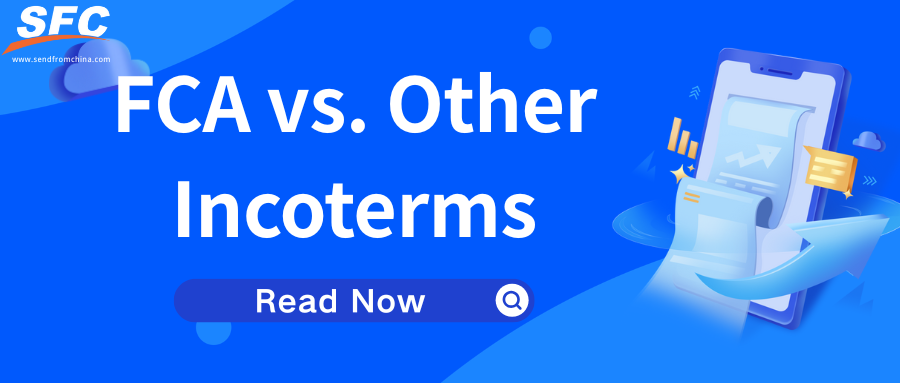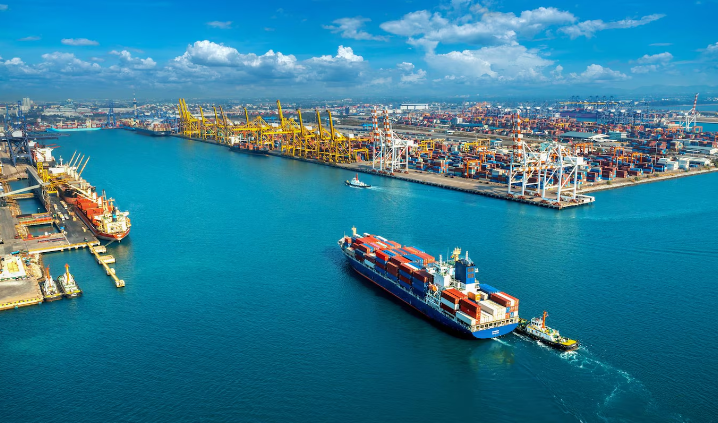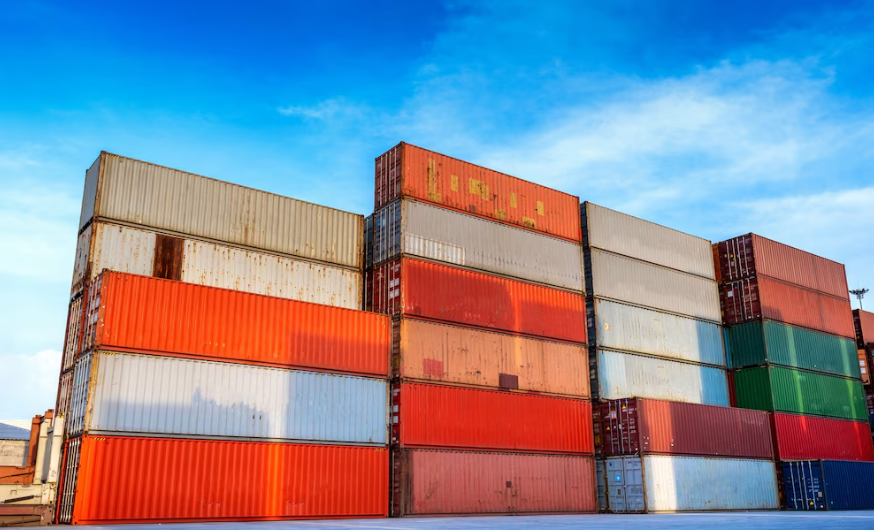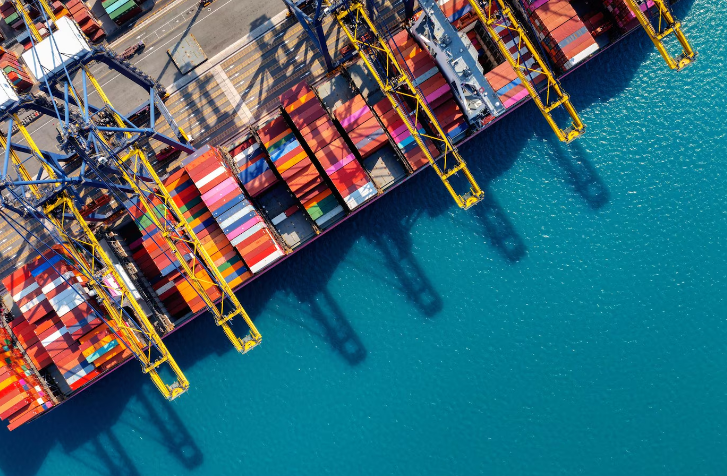Table of Contents
FCA vs. Other Incoterms: What Makes Free Carrier So Flexible?
Time: Jun 09,2025 Author: SFC Source: www.sendfromchina.com
In the intricate world of international trade, the clarity of contractual terms is paramount. The International Chamber of Commerce (ICC) has established standardized terms known as Incoterms to delineate the responsibilities of buyers and sellers in global transactions. Among these, the Free Carrier (FCA) Incoterm stands out for its versatility and widespread adoption.The FCA Incoterm specifies that the seller fulfills their delivery obligation when the goods are handed over, cleared for export, to the carrier nominated by the buyer at a named place. This term is applicable to all modes of transport, including multimodal shipments. Unlike some other Incoterms, FCA provides flexibility regarding the point of delivery, which can be the seller's premises or another agreed location. This adaptability makes FCA suitable for various logistical arrangements, accommodating the diverse needs of international trade.
Understanding the nuances of FCA is crucial for businesses engaged in global commerce. It not only defines the point at which risk transfers from seller to buyer but also clarifies the division of costs and responsibilities. By comprehending the intricacies of FCA, companies can make informed decisions, mitigate risks, and optimize their international shipping strategies.
In this comprehensive guide, we will delve deeper into the FCA Incoterm, exploring its definition, the responsibilities it entails for both buyers and sellers, its advantages, comparisons with other Incoterms, real-world applications, and frequently asked questions. Whether you're a seasoned trader or new to international logistics, this article aims to provide valuable insights into the FCA shipping term.

1. What Is Free Carrier (FCA)? Beyond the Definition
Free Carrier (FCA) is an Incoterm that stipulates the seller's obligation to deliver goods to a carrier or another party nominated by the buyer at a named place. This term is versatile, applicable to all modes of transport, including air, sea, road, rail, and multimodal shipments. The key aspect of FCA is the transfer of risk from the seller to the buyer once the goods are handed over to the carrier at the agreed location.For instance, if a seller in Los Angeles agrees to deliver goods to a carrier at the Port of Long Beach under FCA terms, their responsibility ends once the goods are handed over to the carrier at that port. From that point, the buyer assumes all risks and costs associated with the transportation of the goods.
2. Responsibilities of Buyers and Sellers Under FCA
Under the FCA Incoterm, both the seller and the buyer have clearly defined responsibilities that facilitate efficient international trade. Understanding these obligations is crucial for both parties to ensure smooth transactions and minimize risks.
Seller's Responsibilities Under FCA
The seller's obligations under FCA encompass several key areas:Export Packaging and Marking
The seller must ensure that goods are appropriately packaged and labeled for export, complying with any specific regulations of the exporting country. This includes using suitable materials to protect the goods during transit and marking packages with necessary information such as handling instructions and destination details.Export Clearance
The seller is responsible for completing all export formalities, which include:- Obtaining necessary export licenses and permits.
- Handling customs declarations and inspections.
- Paying any export duties and taxes.
These tasks ensure that the goods are legally cleared for export from the country of origin.
Delivery to the Named Place
The seller must deliver the goods to the carrier or another party nominated by the buyer at the agreed-upon location, known as the "named place." This could be the seller's premises, a freight terminal, or another specified location.- If the delivery occurs at the seller's premises, the seller is responsible for loading the goods onto the buyer's transport.
- If delivery is at another location, the seller's responsibility is to make the goods available for unloading, with the buyer handling the unloading process.
Provision of Documentation
The seller must provide the buyer with necessary documents, which may include:- Commercial invoice.
- Packing list.
- Export licenses or permits.
- Proof of delivery to the carrier.
These documents are essential for the buyer to arrange further transportation and handle import formalities.
Buyer's Responsibilities Under FCA
Once the seller has fulfilled their obligations, the buyer assumes responsibility for the goods. The buyer's duties include:Carrier Selection and Main Carriage
The buyer is responsible for:- Selecting and contracting a carrier to transport the goods from the named place to the final destination.
- Paying for the main carriage, including freight charges and any associated costs.
Insurance
While not mandatory under FCA, the buyer may choose to obtain insurance coverage for the goods during transit to mitigate potential risks.Import Clearance and Duties
The buyer must handle all import formalities in the destination country, which involve:
- Obtaining necessary import licenses and permits.
- Completing customs declarations and inspections.
- Paying any import duties, taxes, and fees.
Unloading and Final Delivery
Upon arrival at the destination, the buyer is responsible for:- Unloading the goods from the carrier's transport.
- Arranging and paying for any further transportation to the final delivery location.
Key Considerations
- Risk Transfer: Under FCA, the risk of loss or damage to the goods transfers from the seller to the buyer once the goods are delivered to the carrier at the named place.- Clear Communication: Both parties should clearly define the named place of delivery and any specific requirements in the sales contract to avoid misunderstandings.
- Documentation: Ensuring all necessary documents are accurately prepared and exchanged is vital for compliance with export and import regulations.
3. The FCA Advantage: Why Businesses Choose This Term
The FCA Incoterm offers distinct advantages that make it a preferred choice for many businesses. Its flexibility, clarity in risk transfer, and cost-effectiveness are among the key reasons for its widespread adoption. Let's delve deeper into the benefits that FCA provides to both buyers and sellers.
Versatility Across All Modes of Transport
One of the standout features of FCA is its applicability to all modes of transportation—be it sea, air, rail, road, or multimodal shipments. This universality allows businesses to employ FCA in various logistical scenarios, making it especially suitable for containerized and cross-border logistics.Clear Division of Responsibilities
FCA delineates the responsibilities of buyers and sellers with precision. The seller is obligated to deliver the goods to a carrier or another party nominated by the buyer at a specified location, after which the buyer assumes responsibility. This clear demarcation reduces the potential for disputes and ensures that both parties are aware of their obligations.Cost Control and Negotiation Power for Buyers
Under FCA terms, buyers have the autonomy to select their preferred carriers and negotiate freight rates. This control can lead to cost savings and allows buyers to align shipping schedules with their operational needs. Additionally, buyers can choose carriers that offer better service levels or specific logistical advantages.Reduced Liability and Simplified Processes for Sellers
For sellers, FCA offers the benefit of reduced liability. Once the goods are delivered to the carrier at the named place, the risk transfers to the buyer. This shift allows sellers to focus on their core operations without the complexities associated with international transportation. Moreover, handling export clearance under FCA ensures that sellers maintain control over the export process, reducing the chances of delays.Enhanced Efficiency in Multimodal Shipping
In today's global supply chains, shipments often involve multiple modes of transport. FCA's flexibility makes it ideal for such multimodal shipments, allowing goods to transition seamlessly between different transport methods. This adaptability streamlines logistics and can lead to faster delivery times.Alignment with Modern Trade Practices
The 2020 revision of Incoterms introduced provisions that enhance the practicality of FCA. For instance, when goods are sold FCA for carriage by sea, and the buyer or seller requires a bill of lading with an on-board notation, the parties can agree that the buyer will instruct the carrier to issue such a document to the seller. This adjustment facilitates transactions that rely on letters of credit, where proof of shipment is essential.4. Differences Between FCA and Other Shipping Incoterms
Understanding the distinctions between the FCA Incoterm and other commonly used Incoterms is essential for businesses engaged in international trade. Each term delineates specific responsibilities, risks, and costs between buyers and sellers. Below is a comparative analysis of FCA with EXW, FOB, CIF and,other prevalent Incoterms:
FCA vs. EXW (Ex Works)
- Export Clearance: Under EXW, the buyer is responsible for export clearance, including obtaining licenses and handling customs formalities. In contrast, FCA places this obligation on the seller, simplifying the process for the buyer.- Loading Responsibilities: EXW requires the buyer to load the goods at the seller's premises, whereas FCA obligates the seller to load the goods if the delivery occurs at their premises.
- Risk Transfer Point: In EXW, risk transfers to the buyer once the goods are made available at the seller's premises. With FCA, risk transfers when the goods are delivered to the carrier at the named place.
- Applicability: Both terms are suitable for all modes of transport.
Summary: FCA offers more support from the seller, particularly concerning export procedures and loading, making it more favorable for buyers unfamiliar with the export country's regulations.
FCA vs. FOB (Free on Board)
- Mode of Transport: FOB is limited to sea and inland waterway transport, while FCA is applicable to all modes, including air, road, and rail.- Delivery and Risk Transfer: Under FOB, the seller's responsibility ends once the goods are loaded onto the vessel at the port of shipment. In FCA, the seller fulfills their obligation when the goods are delivered to the carrier at the named place, which could be a port, terminal, or another location.
- Containerized Cargo: FCA is preferred for containerized shipments, as it accommodates the complexities of modern logistics better than FOB.
Summary: FCA provides greater flexibility and is more suitable for multimodal and containerized transport, whereas FOB is traditionally used for bulk sea shipments.
FCA vs. CIF (Cost, Insurance, and Freight)
- Cost and Risk Allocation: In CIF, the seller bears the costs of freight and insurance up to the destination port, with risk transferring to the buyer once the goods are loaded onto the vessel. FCA requires the buyer to handle freight and insurance from the point the goods are delivered to the carrier.- Insurance Responsibility: CIF mandates the seller to procure insurance for the buyer's benefit, whereas under FCA, obtaining insurance is the buyer's responsibility.
- Applicability: CIF is exclusively used for sea and inland waterway transport; FCA is versatile across all transport modes.
Summary: CIF offers a more comprehensive service from the seller, covering freight and insurance, while FCA provides buyers with greater control over shipping arrangements and associated costs.
FCA vs. DDP (Delivered Duty Paid)
- Seller's Responsibilities: DDP places maximum responsibility on the seller, who must deliver the goods to the buyer's location, covering all costs, including import duties and taxes. In FCA, the seller's obligation ends once the goods are delivered to the carrier at the named place, with the buyer handling subsequent costs.- Risk Transfer: Under DDP, risk transfers to the buyer upon delivery at the final destination. In FCA, risk transfers when the goods are handed over to the carrier.
- Complexity: DDP can be complex for sellers unfamiliar with the import regulations of the buyer's country, whereas FCA limits the seller's involvement to the export process.
Summary: DDP offers a turnkey solution for buyers, with the seller managing the entire shipping process, including import formalities. FCA, conversely, provides a balanced approach, with responsibilities shared between both parties.
5. FCA in Action: Real-World Applications

Case Study 1: E-Commerce Machinery Export
A Chinese manufacturer agrees to "FCA Shanghai Port" with a German buyer. The seller:1. Packs machinery for export
2. Arranges trucking to Shanghai Port
3. Clears Chinese customs
4. Delivers containers to the buyer’s carrier at port
Risk transfers upon carrier acceptance. The German buyer then:
5. Contracts ocean freight to Hamburg
6. Insures the shipment
7. Clears EU customs
8. Arranges final delivery
Case Study 2: Avoiding EXW Pitfalls
A U.S. importer switches from EXW to FCA with Turkish suppliers. Previously under EXW, they struggled with Istanbul export clearance from abroad. With FCA, suppliers now handle Turkish export formalities, reducing delays by 11 days average.Strategic Niches for FCA
- Land Transport in Europe/Central Asia: Trucks collecting goods often handle entire transit, making FCA seamless.- Multi-Carrier Shipments: Ideal when goods move via rail to port, then ocean vessel.
- E-Commerce Fulfillment: Sellers manage local delivery to logistics hubs; marketplaces handle international legs.
6. Conclusion
Free Carrier (FCA) is a versatile and widely adopted Incoterm that balances responsibilities between buyers and sellers. Its applicability across all transport modes, clear risk transfer point, and flexibility in carrier selection make it a valuable tool in international trade. By understanding and effectively implementing FCA terms, businesses can streamline their operations, manage risks, and foster successful cross-border transactions.7. FAQs
Q1: Can FCA be used for air shipments?
Yes, FCA is suitable for all modes of transport, including air, sea, road, and rail.Q2: Who is responsible for export clearance under FCA?
The seller is responsible for obtaining export licenses and completing export customs formalities.Q3: When does the risk transfer from seller to buyer in FCA?
Risk transfers when the seller delivers the goods to the carrier or another nominated party at the agreed place.Q4: Is the seller responsible for unloading the goods at the named place?
No, under FCA, the buyer is responsible for unloading unless otherwise agreed.Q5: Can FCA terms be used when the buyer arranges their own transportation?
Yes, FCA is ideal when the buyer wants to control the main carriage and select their preferred carrier. Post Views:1187
Post Views:1187
Copyright statement: The copyright of this article belongs to the original author. Please indicate the source for reprinting.
Previous Post
Differences Between Wholesale and Retail: A Comprehensive Guide
Next Post
Work in Process Inventory Explained: Meaning, Formula, and Importance
TAGS
Hot Research
Get a Custom China Fulfillment Solution with FREE Storage for 30 Days
 Want to know about our services, fees or receive a custom quote?
Want to know about our services, fees or receive a custom quote?
 Please fill out the form on the right and we will get back to you within a business day.
Please fill out the form on the right and we will get back to you within a business day.
 The more information you provide, the better our initial response
will be.
The more information you provide, the better our initial response
will be.





 TAGS:
TAGS: